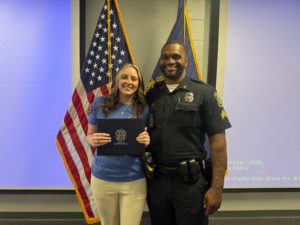Briana Gordley LMSW, known to her friends and family as Bri, grew up in Texas with her Kentucky-native parents knowing she was destined to be a Wildcat. When she started at the University of Kentucky in the fall of 2016 as a psychology major, she felt a disconnect in her coursework. Midway through her semester, she found U.K.’s digital major-finding tool, and it promptly suggested Social Work as a potential path based on her interests. For Bri, this pivotal decision to change her major to Social Work altered the course of her life.
“In my very first social work class, I knew this was the degree I was meant to pursue.”
During her undergraduate years at U.K., Bri interned for Greenhouse 17, the local domestic violence program in Lexington, KY, and then for ZeroV (formerly the Kentucky Coalition Against Domestic Violence). Her work proved to be an emotional and structural challenge, frequently leaving her grappling with structural hurdles tied to policies and regulations, paperwork, and funding.
“I would see that clients were doing all the right things but still not reaping the benefits, which piqued my interest in systemic barriers.”
Eager to advocate for systematic changes but unsure of the path ahead, Bri pursued her master’s degree in social work at the University of Texas Austin. While completing her MSSW, she worked closely in community housing management and resourcing for survivors of domestic violence, concurrently taking on a legislative internship with the National Association of Social Workers – Texas Chapter.
“I picked the administration and policy practice track because I wanted to explore every facet of social work. When I got my first internship in policy and lobbying, I felt that I was finally in the right space.”
As she conducted bill analyses for NASW-TX priority legislation and supported the implementation of the NASW-TX Social Work Advocacy Day, Bri found herself increasingly focused on the realms of financial and economic abuse and the ways in which policy advocacy can promote self-sufficiency and financial wellbeing for survivors of domestic violence.
“There are barriers that transcend the shelter, survivor, or situational aspects; they are ‘higher-up’ issues. That’s when I recognized the path towards more policy and legislation work for structural change.”
Today, Bri is a Licensed Master Social Worker and works as a Senior Policy Analyst at Texas Appleseed, where she champions consumer protection rights, actively advocates for regulations aimed at reducing financial exploitation of vulnerable populations, and tackles systemic obstacles that affect the overall financial wellbeing of Texans., and s. She collaborates with her team and a network of coalition partners and stakeholders, both during the legislative session and interim period, to help build systems to support enhancing financial protections for people that need them the most.
“I work in policy, but I work closely with the communities burdened by these issues, approaching it from the perspective of “how can we create a plan that genuinely helps people on the ground.’”
Bri is a strong advocate for asking questions. The theme “Don’t be afraid to ask why” resonated throughout her journey, from working in domestic violence shelters to fighting for policy changes at the Texas Capitol. She encourages fellow students to use the resources available at UK CoSW, prioritize their mental well-being, engage in peer support groups, and tap into the extensive and accessible network within the community.






